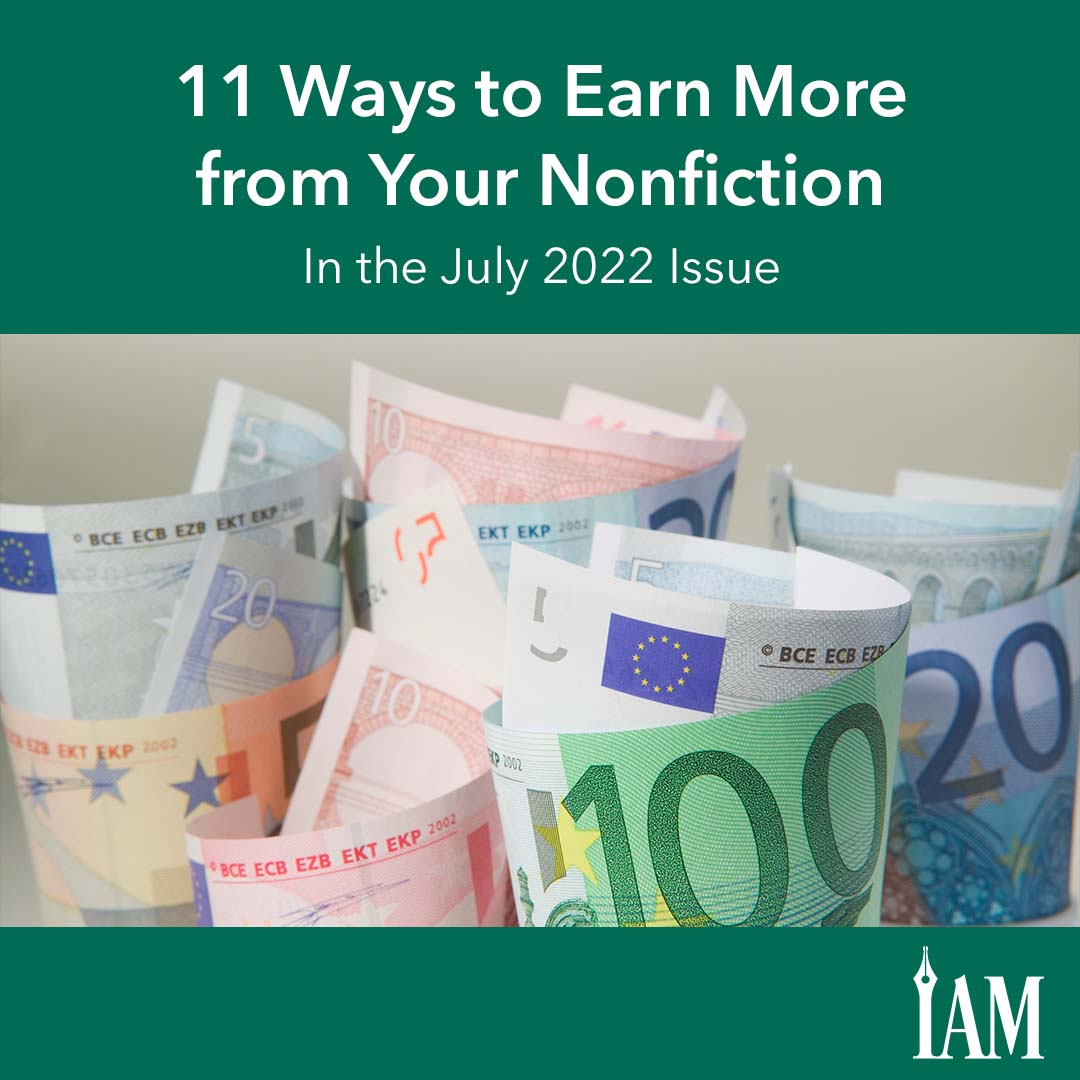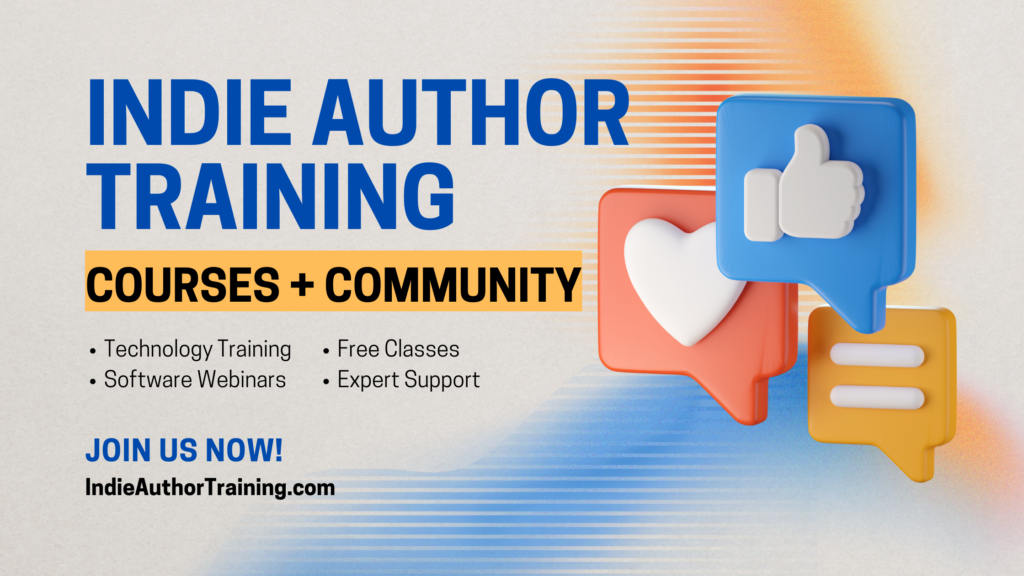You’ve no doubt heard the truism, “Don’t put all your eggs in one basket.” But if you’re a nonfiction author still selling on only one platform, your income eggs are tightly packed into one container.
You can make money in a myriad of ways from your nonfiction backlist. Create multiple streams of income for yourself, and no matter what might happen to your platform down the road, you won’t run the risk of being left hanging.
That’s easy to write, but where do you begin?
To start, you need passive income as well as active income.
When you write a freelance article or provide consulting, you have to do the work every time you want to make money, and you can only sell that article or consulting time once. That’s active income. And given we have only twenty-four hours in each day, you might really struggle to scale your income past a certain point if that’s all you do.
However, when you create an asset, such as a course, video, or book, you can sell that product thousands of times without ever creating anything else. That’s passive income. Of course, you still have to do some work to sell what you’ve created—passive income isn’t completely passive. But you’re not exchanging time for money anymore. There’s really no limit on what you can earn with that model.
You’ve already worked toward having passive income if you have a nonfiction backlist. Here are just some ways you can bring in new income streams to ensure you thrive in your nonfiction career:
1) Cross-promote your books
The easiest way to make more money from your nonfiction is to add links in the back of each of your nonfiction books to promote the rest of your backlist.
Nothing is stopping you from referencing and recommending other books you’ve written within the content of your other books. Don’t overdo it, though. A common complaint in reviews for some nonfiction books is that the author appears to be simply copying from and promoting their other books in the text rather than writing anything new.
As long as you know what you’ve linked to is genuinely helpful, this technique should work for you.
2) Maximize your formats
Ebook, print, large print, hardback, audiobook. How many of those different formats have you set up? You’ve already written the content. All you need to do is change the format of your current work, and you’ll have a whole new product. You’ll also be catering to people who prefer to listen rather than read and to people with disabilities.
3) Translate your books
English is an international language, but there’s a whole world out there. At the time of this article, Amazon alone will let you self-publish in over forty different languages, and they’re working on adding to that.
Why not take advantage of that and break into global markets?
4) Add workbooks
People love to work through exercises and guided prompts when they’re learning something new. Could any of your current books benefit from accompanying workbooks?
If you create a workbook for each nonfiction title you already have, you’ve just doubled your published books and created another product for people to buy.
5) Create courses
How many ebooks do you need to sell to bring in a thousand dollars compared with a single thousand-dollar course? We’ll let you do the math. You can create a large course based on your whole book, a series of minicourses based on each chapter, or both, as long as each course offers solid value to your readers. Add video and audio, checklists, worksheets, planners, and anything else that might be beneficial. You could even offer a small email course delivered automatically by an autoresponder.
Don’t forget to encourage people to join your email list with a lead magnet, such as a bonus ebook or free course. Once they’re on your list, you can market your newest nonfiction books, courses, and any other products.
6) Set up a membership
Recurring monthly income, FTW! Package your knowledge into a continuing membership where people pay a fixed fee every month to learn from you.
If you charge only ten dollars a month but have anywhere from a few hundred to a thousand members, your income will see a nice boost.
7) Offer coaching and consulting
The more access people have to you, the more they will pay if they want to learn from you. You could charge a higher rate for group coaching than you would for a course, and an even higher rate for one-to-one coaching—all from the knowledge you already have.
8) Recommend other products and courses
If you sign up as an affiliate for other businesses, you will earn a commission if someone buys their product through your affiliate link. The best type of affiliate income is recurring income where you are paid every month to sell a product once.
You can add affiliate links to your courses, blog posts, your email signature, your website copy, your email newsletters, and more. Find affiliate products and courses to promote that relate to the subject matter covered in your nonfiction. Just note, the Federal Trade Commission requires that you state that these links are affiliate links (https://ftc.gov).
Do your research and only recommend relevant products that you really believe in. Your reputation matters, and you don’t want to damage it by recommending unethical or unhelpful products.
9) Get your merch on
Think beyond books to merchandising opportunities. You could sell mugs, T-shirts, key chains, bookmarks, tote bags, notebooks, stickers, and more, all branded to fit with your books and your author business. You can do this directly on your website, on Etsy, or via a site such as Zazzle (https://zazzle.com) or RedBubble (https://redbubble.com).
10) Speak and earn
You can be paid to speak at conferences and events. If you’re comfortable with this, it can be an excellent stream of income and a great opportunity to promote your nonfiction books. In addition to payment for speaking, you can also receive travel expenses and accommodations, depending on the event.
To find speaking opportunities, get to know other speakers and conference and event organizers. Join related Facebook groups and look out for author events, literary festivals, and other suitable events. Network to find out about opportunities, and be proactive in approaching organizers.
Pro Tip: Don’t forget to bring physical copies of your books so that you can sell them at the event after your speech.
11) Sell the shovel
Who got rich in the gold rush? The people who sold the shovels.
If you’re a highly successful nonfiction author, can you teach others how to publish their own nonfiction work? You might have your own specialist subjects for your books, but if you’ve done it for long enough, you’ll know a whole lot about writing nonfiction and making a success of it.
Your knowledge is valuable, and people will pay for it. Consider doing the following:
- creating a series of small courses on different aspects, such as research or planning.
- writing a nonfiction book on how to write a nonfiction book (very meta!) or on self-publishing.
- setting up a membership for people who want to learn from you.
- providing group coaching.
These are only some ways to make more money from your nonfiction books. You could also consider sites such as Patreon or Kickstarter, sponsorships, licensing your content, private label rights, and more.
Take it slow! If you try to do everything at once, you’ll find yourself stuck or burned out very quickly. Add one stream of income at a time and build it up little by little when you know you have the time and the mental space for more. Eventually, you should see your income increase over time, and you’ll find that you’re no longer reliant on just one income stream or platform.
One final bit of advice: Don’t limit yourself. Keep thinking about what you can adapt and keep an eye on technology. New possibilities are emerging all the time. The current craze for NFTs has hit the publishing world, for example, and you could find a way to get your own slice of that pie. Who knows what might be invented next?
The only certainty is that there is no certainty. If you have multiple streams of income, you’re more likely to be protected from the vagaries of the publishing world and the global economy.
And that creates real peace of mind.





